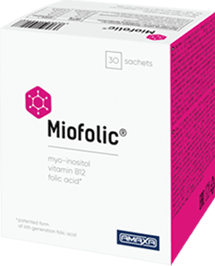There is no consistent medicine for PCOS treatment, but effective control of symptoms can be achieved by changing the way of life, as well as by taking special drugs such as Miofolic.
One of the simplest measures is weight control. Weight loss can be very difficult, but body mass correction is an integral part of the general polycystic ovary syndrome treatment regimen. Also, diet plays a significant role in the treatment of PCOS.
Physicians can prescribe medications to reduce insulin levels, acne and unwanted hair growth, and normalize the menstrual cycle. If a woman is planning a pregnancy, she might need infertility treatment and additional support. Her doctor will be able to help with all these concerns.
The International Federation of Obstetricians and Gynecologists (FIGO) advises women to consult a doctor in all cases when there are problems with the menstrual cycle, infertility or signs of an androgen excess, severe acne and excessive hair growth.
Early detection and timely correction of the changes help reduce the frequency of possible complications, especially such as diabetes mellitus and heart pathology.
For women with PCOS who have insulin resistance, treatment with Miofolic normalizes the hormone level, reduces acne and excessive hair growth, restores and regulates the menstrual cycle and normalizes blood pressure.
Significant improvements with the use during pregnancy
In pregnant women with PCOS, Miofolic reduces BMI (body mass index), normalizes the gestation period to 39.3 weeks and reduces the incidence of diabetes developing. Data indicates that there are no adverse effects when taking Miofolic at the recommended dose of 2 sachets per day. The main benefits are shown here.
Insulin resistance
Insulin resistance (decreased insulin sensitivity) is observed in 50-70% of women with PCOS, regardless of their weight.
